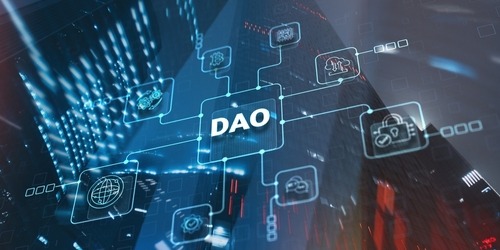How decentralized autonomous organizations reflect an ancient Islamic principle
When we talk about DAOs (decentralized autonomous organizations), the conversation usually revolves around blockchain technology, decentralized governance, and the future of the internet.
But what if I told you that the essence of a DAO — community-driven decision-making, mutual responsibility, and shared ownership — has been a core part of Islamic history for centuries?
DAOs offer an opportunity to revive these values in a modern, digital context. Let’s explore how DAOs are not just a tech innovation but a continuation of cooperative systems we’ve practiced for centuries in Islam.
What is a DAO?
A DAO is an organization governed by code, not by a central authority. Decisions are made collectively by stakeholders through blockchain technology.
Think of it as a global cooperative where each member has a voice, and all decisions are transparent and executed automatically via smart contracts. DAOs operate on decentralization, trust, and shared ownership - values that resonate deeply with Islamic ethics.
Shura: The Islamic tradition of collective decision-making
One of the foundational elements of DAOs is collective decision-making, and that’s where Islam has a lot to teach us. The concept of shura (consultation) is central to Islamic governance.
In the Qur’an, Allah instructs the Prophet Muhammad (ﷺ) to consult with his followers in matters of mutual concern: “…and consult them in the matter. And when you have decided, then rely upon Allah” (3:159).
Shura involves the community in decision-making - a system where individuals’ opinions are valued. This reflects the democratic essence of DAOs, where every participant has a vote. Shura can be seen as a precursor to DAO governance. Decisions are made collectively, with no single person dictating the organization’s future.
Waqf: The Islamic model of decentralized charity
DAOs often manage collective funds transparently, paralleling the Islamic practice of waqf. A waqf is an endowment, typically for charitable purposes, managed by trustees on behalf of the community.
The waqf system operates independently from centralized control, with trustees ensuring the community benefits. The structure is transparent, much like DAOs, where resources are decentralized and managed for the collective good with accountability at its core.
The Ummah: Community and mutual ownership
Islam emphasizes the ummah - the global Muslim community united by faith, support, and shared responsibility. In a sense, DAOs extend this concept into the digital age. The ummah is decentralized, spread across continents and cultures, yet connected by faith and a collective sense of belonging.
DAOs, much like the ummah, function on shared ownership and responsibility. Each member of a DAO has a stake in its success, with decisions made for the collective benefit. Just as the ummah operates without a central leader, relying on mutual cooperation, DAOs embody this decentralized approach to governance.
Zakat: Financial responsibility and fair distribution
The principle of Zakat (obligatory charity) parallels another critical component of DAOs: fair and transparent wealth distribution.
In the same way that Zakat ensures equitable wealth distribution in the Muslim community, DAOs can ensure resources are allocated fairly. Whether focused on charity, community projects, or business, DAOs are designed to prevent exploitation and promote fairness.
What’s compelling about DAOs is their removal of intermediaries. Just as Zakat is a direct transaction between the giver and those in need, DAOs allow participants to decide directly how funds are used, cutting out middlemen who could misuse resources.
A return to Islamic values through technology
So, where does that leave us as Muslims in this increasingly decentralized world? The answer is clear: DAOs are not just compatible with Islamic values - they are an opportunity to revive and enhance those values using modern technology.
We live in an age where transparency, collective decision-making, and mutual ownership are not just ideals; they are achievable realities thanks to blockchain and decentralized systems.
By embracing DAOs, we are not merely adopting a new technological trend. We are returning to the heart of our Islamic tradition - one that values consultation, transparency, mutual support, and equitable resource distribution. DAOs allow us to create a new kind of ummah, one that is digital but grounded in the principles of our faith.
This is more than just an opportunity; it’s a responsibility. We now have the tools to build systems that reflect the best of Islamic governance, charity, and cooperation.
The question is, are we ready to step into this new digital frontier, guided by the values that have been with us all along?
Sharene Lee is chief operating officer and Ameerah Langer is brand & communications head at Takadao

Sharene Lee